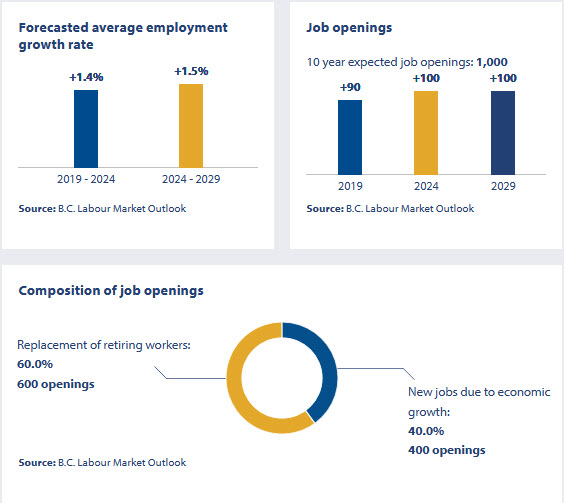Working as a Psychologist

Industry Overview
There is a growing demand for psychologists in British Columbia in order to meet public and mental health-care needs. Opportunities will become available in rehabilitation centres, schools, social services and health programs that combat drug dependency, family violence, crime and other mental health issues. Opportunities in private practice will also continue to be strong.
Industry sources report that northern B.C. currently requires more practitioners. As well, graduates who focus on neuropsychology and forensic psychology are in high demand.
Job Outlook in BC

Chart from: Work BC
WorkBC provides job openings in BC regions from 2019 to 2029:
You can learn more about working in BC from the following sources:
Types of Employers
Psychologists work in many settings including:
- Private or public clinics,
- Correctional facilities
- Hospitals
- Mental health facilities
- Rehabilitation centres
- Community service organizations
- Businesses
- Schools and universities
- Government and private research agencies
Salary & Working Hours
In BC the median annual salary for psychologists is $92,079.
Full-time, salaried psychologists usually receive benefits in addition to their salaries. Benefits generally include paid vacation time, paid sick leave, and dental and additional health insurance.
Source: WorkBC
Job Bank Canada provides hourly wages for Psychologists in BC regions:

Source: Job Bank, Canada
Working Hours
Typical working hours depend on the specific job and level of responsibility. Some psychologists have a standard 40-hour week; others may work more.
Psychologists working in private practice or in clinical, school or counselling psychology tend to set their own office hours. They often work evening hours to accommodate client schedules.
Those employed in institutions, such as correctional facilities, hospitals and other health facilities, may be required to work evenings and weekends on an as-needed basis. Psychologists employed by academic institutions generally have flexible schedules but may work long hours.
Source: WorkBC
